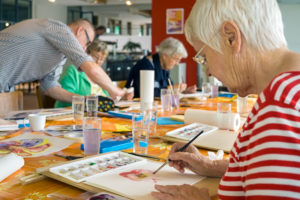
Arts and humanities may sound like a surprising background for a prospective health care professional, but it shouldn’t! Diversity in the backgrounds of health care providers is what makes the field so successful.
While we won’t go so far as to say your major doesn’t matter, there is no data that supports majoring in biology or chemistry will increase your chances of acceptance to a medical graduate program. Take, for instance, the fact that the MCAT includes questions on social studies and humanities. Well-rounded students may have a higher likelihood of success on this important test.
A liberal arts degree can give you practical skills that are very useful in the health care field. Nursing student Malori Mayor, who has an undergraduate degree in music, agrees wholeheartedly. “I think that being in music has given me an intuition that will be valuable as a nurse,” Mayor says. “As a classical musician, especially when you’re performing with a group, you have to be sensitive to what others around you are doing and have an intuition so you can be in sync. As a nurse, you need to be sensitive to the needs of your patients and anticipate what they will need before they say it.”
Skills such as communication, creative expression, and analytical thinking easily cross over from humanities into the health care field. An interest in the arts can also expand your capabilities as a health care professional. “Being a musician requires creativity. While critical thinking is a large part of nursing, so is creativity and finding solutions no matter what the circumstance,” Mayor adds.
Consider majoring in something that interests you and taking some premed courses to even out your studies. Just like there are tax attorneys and family law attorneys, there are all types of careers within the health care field that require additional skills. Some health care careers are founded on an arts and humanities education. One such example is an art therapist as these health care professionals use art to promote mental, physical and emotional well-being. All types of art, from sculpting to drawing to painting, can be used by an art therapist in their everyday work.
